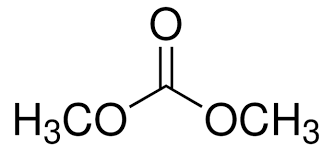Lithium Battery & Electrolyte Chemicals
Dimethyl Carbonate

Product Description
Dimethyl carbonate (DMC) is an organic compound used as a green solvent in various industrial applications.
Product:
Dimethyl Carbonate
CAS:
616-38-6
Synonym:
DMC; Methyl carbonate; Carbonic acid dimethyl ester
Structure:

Typical Characteristics
Appearance
Colorless liquid
Boiling point
90 °C
Density
1.07 g/cm3
Flash Point
17 °C
Melting point
2 to 4 °C
Molecular Weight
90.078
Odor
Pleasant odor
Purity
≥99%
Refractive index
1.368
Uses, Applications & Markets
Key applications
get a quote
We Offer Dimethyl Carbonate
in various grades
A few of the grades available are listed below:



Dimethyl Carbonate used in many
industry applications
Dimethyl carbonate (DMC) is a versatile chemical compound with various industrial applications. Here's a list of some of its uses:
- Solvent: DMC is used as a green solvent in various industries, including pharmaceuticals, coatings, adhesives, and electronics. It is valued for its low toxicity, low volatility, and high solvency power. DMC serves as a safer alternative to traditional volatile organic solvents like methylene chloride and acetone.
- Polycarbonate Production: It is used as a precursor in the synthesis of polycarbonate resins, which are widely used in the production of automotive parts, electrical components, and optical discs. DMC reacts with bisphenol A (BPA) or other diols to produce polycarbonate polymers through transesterification or phosgenation processes.
- Lithium Battery Electrolyte: DMC is utilized as a solvent and electrolyte additive in lithium-ion batteries. It improves the conductivity and stability of the electrolyte solution, enhancing battery performance and safety. DMC is preferred over traditional carbonate solvents due to its lower viscosity and higher flash point.
- Chemical Intermediate: DMC serves as a versatile intermediate in the synthesis of various organic compounds, including pharmaceuticals, agrochemicals, and specialty chemicals. It participates in esterification, carbonylation, and transesterification reactions to produce a wide range of value-added products.
- Paint and Coatings: DMC is used as a solvent and coalescing agent in water-based paints and coatings. It helps improve film formation, adhesion, and durability of coatings while reducing volatile organic compound (VOC) emissions. DMC is preferred for its low odor and environmental friendliness.
- Gasoline Additive: DMC is employed as an oxygenate additive in gasoline formulations to improve octane ratings and reduce emissions of harmful pollutants, such as carbon monoxide and hydrocarbons. It enhances combustion efficiency and reduces engine knocking in gasoline-powered vehicles.
- Pharmaceuticals: DMC is used as a solvent and reagent in pharmaceutical synthesis and formulation processes. It is employed in the production of active pharmaceutical ingredients (APIs), drug intermediates, and drug delivery systems. DMC offers advantages such as high purity, low toxicity, and biodegradability.
- Herbicides and Pesticides: DMC serves as a solvent and carrier in the formulation of herbicides, pesticides, and insecticides. It helps dissolve active ingredients, enhance penetration into plant tissues, and improve sprayability of agrochemical formulations. DMC is valued for its compatibility with a wide range of agricultural chemicals.
- Electronics Cleaning: DMC is used in electronics manufacturing for cleaning and degreasing electronic components, circuit boards, and precision instruments. It effectively removes flux residues, soldering fluxes, and other contaminants without leaving residues or damaging sensitive electronic materials.
- Adhesives and Sealants: DMC is utilized as a solvent and plasticizer in the formulation of adhesives, sealants, and encapsulants. It improves the flow, wetting, and adhesion properties of adhesive formulations while reducing VOC emissions and environmental impact. DMC-based adhesives are used in automotive, construction, and electronics industries.